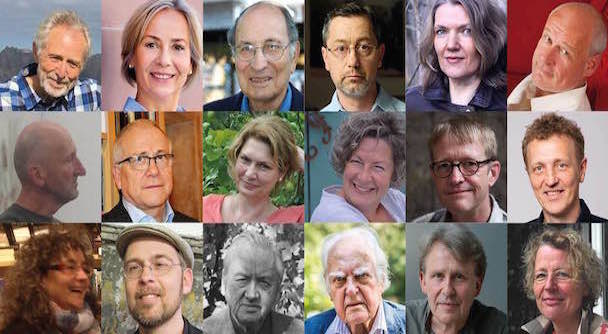Authors & Books
Thomas Schwab
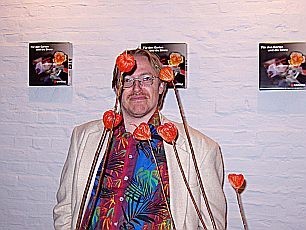
Born in 1960 in Seligenstadt. Studies of philosophy, German and Romance in Tübingen, Vienna and Frankfurt / Main. Inter alia lyrical publications („Ablauf der Dinge“ – engl. „Process of things“, 1995 and „Der Leser auf Reisen“ – engl. „The reader on a journey“, 1997 in the series "16pages"). At this time he works on a two-volume prosa- and lyrical book about Polynesia („Tausendinselwelten“ and „Seligenstadt – Papeete“).
Our picture shows him with the second volum of »Literaten im Garten« – in his back the package, in which our sponsor partner Gardena AG delivered the book together with a new pair of sicors for roses – the foto had been taken during a presentation of the book in a major gardening company in Frankfurt, Germany.
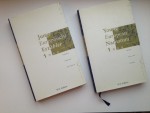
SCA Young European Narrators
5 Narrations
- 202 pages
- hardcover
- with ribbon and jacket
- 20 Euros
- Introduction by Hilmar Hoffmann
SCA

Contents
Documents Concerning the Gambler Rubashov
Beginning of a novel by Carl-Johan Vallgren
The Inner Island
Short prose by Katrin Heinau
The Other Man
Short story by Scott Bradfield
Eternity Captured by the Second
44 poetical episodes by Thomas Schwab
Nur Hereinspaziert!…
An Author’s life narrated by Dominique Ponçet
Introduction by Hilmar Hoffmann
Europe as a narrative: Would this not be a good idea? Were this the case, defining and discussing Europe’s borders would become superfluous. Europe would then not end at the foot of the Ural mountains, but quite simply there where its stories are no longer heard, read, or understood. It would be pointless to define Europe’s identity because with the stories (including our own deeds), Europe would become a never-ending story, an open narrative. To be able to tell stories is the prerequisite for being able to give the relationship to reality a literary form.
Basically this is the oldest understanding of Europe. Only if, and as long as it remains a story with an open end, will the continent remain alive, because the people see themselves, their wishes and hopes reflected in it.
Such a Europe cannot be an end in itself. The „Narrative Europe“ finds its legitimation in the quality of the life perspectives of its citizens, in the motivating richness of its Arts, in its cultural discourse and in the lasting contribution to a world that is at peace and capable of a future.
Europe will gain this quality only if it does not sell out on its own standards. The better periods of its history enabled the development of what is known as Europe’s cultural heritage—its contribution to today’s world culture. Today this heritage is world heritage and Europe should not stagnate by refering to the common cultural traditions. No, instead of „museumising“ the values, these have to be developed further in order to signalise the fact that the European claim to a humane standard of living is possible in times of Globalisation and the „Crisis of Modernism“.
It is therefore necessary that the extreme differences be-tween poor and rich no longer be tolerated. As long as Europe continues to accept poverty and destitution amongst its citizens as a necessary evil in the attempt to stimulate the economy, critical voices will continue to oppose this direction in an attempt to protect the human dignity. The same applies to the supression of minorities and acceptance of intolerance, if it gives in to organised crime with its humane standards of law.
What is acknowledged by the big Narrative as being the most important goals and qualities of the European Unification in the post war period, is the burning desire of the younger generation to be able to make the bloody wars of the nationstates a thing of the past.
In the same way as the Europeanisation of the German Question was an attempt to keep a tight rein on German militarism and to tame German revanchism, so will territorial wars become obsolete in a unified Europe—at least as long as justice is secured for its citizens (in this, let Jugoslavia serve as a warning), outside interference is warded off, and their integrity protected by acceptance of central institutions.
Unity amid the diversity should be of central importance. Europe should be a territory of tolerated, approved, positive evaluated variety, and—why not—show others that such politics of welfare is good for the people.
Paragraph 1 of the much quoted article 128 of the Maastrich Agreement states: „The community is making its contribution to the cultural development of its member states by safeguarding their national and regional variety whilst emphasizing the common cultural heritage.“ The Community will make this possible with „supportive measures under exclusion of any harmonisation of the legal and administrative regulations of the member communities“, as it is stated in paragraph 5. This is neither a sad compromise nor it is an empty phrase—it is political, structural goal. In this lies one of the important prospects for the future and standing of Europe.
The many voices of Europe increase the likelihood that certain personalities take an active part in contributing to Europe’s future. Being able to make individual demands
is therefore not an obstacle, but a prerequisite for a uni-
fied Europe. One particular advantage of the „European variety“ is the fact that all attempts at homogenisation can be rejected. This programme of unity amongst diversity cannot reduce itself on a higher level to a homogenous block, that much the same as once the nationstates, now compete with similar closed unity. For this reason alone I am sceptical of the strong incantation of „European common interests“: those who plea for this are those who would much rather fence themselves off from ohters. But the right perspective is not the fencing off, it is openness, as is pro-duced by quality of life and politics.
It certainly cannot be the European goal to substitute those age-old European enemies Germany versus France with similar anachronistic enmities, such as Europe and the Islamic or Confucian world. Europe is only attractive as a global partner if it consciously works at finding global structures which enable us to live with a mutual acceptance of differences and help us to accept this „being different“
as a productive factor. Europe will become an open-ended narrative if it reorganizes itself in such a way as to enable old structures to give way to new and better ones.
A narrative is not a narrative without the narrative voice or a storyteller. As history has shown, storytellers can work miracles. The German ethnologist, Leo Frobenius once told the miraculous story of an African storyteller called Far-Limas who once, in the kingdom of Sudan, saved his own and his King’s life by telling „stories that were as sweet as honey and intoxication as hashish“. By telling these stories he prevented the wisemen of the country from watching the stars, with the result that they could not determine the correct time to make the human sacrifice…
Those storytellers who tell us about the history of Europe keep this continent alive. They create vital images, images which we all can relate to. These storytellers should be encouraged and supported so that they can enrich our society with their visions and insights: imagination, provocation and inspiration, such important contributions to the big European narrative. Our fears and worries, our hopes and wishes, our future depends on this input.
Hilmar Hoffmann
(former president of Goethe Institute)
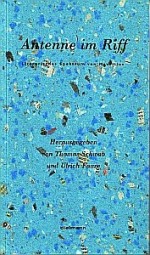
Antenne im Riff
Mauritanian authors
- 240 pages
- Series Label (Reihe ETIKETT)
978-3-929232-60-8

The stories from the island paradise Mauritius, which are congregated in this volume, are anything but a beautiful literary paraphrase on the glossy pictures, which want to make Mauritius tempting for us.
The first anthology in German language with short prose works and poems from Mauritius.
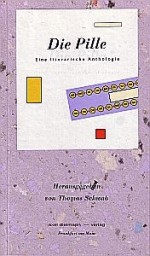
The pill
A literary anthology
- Sponsored by Wyeth Pharma GmbH Münster
- 144 pages
- Series Label (Reihe ETIKETT)
978-3-929232-34-9







